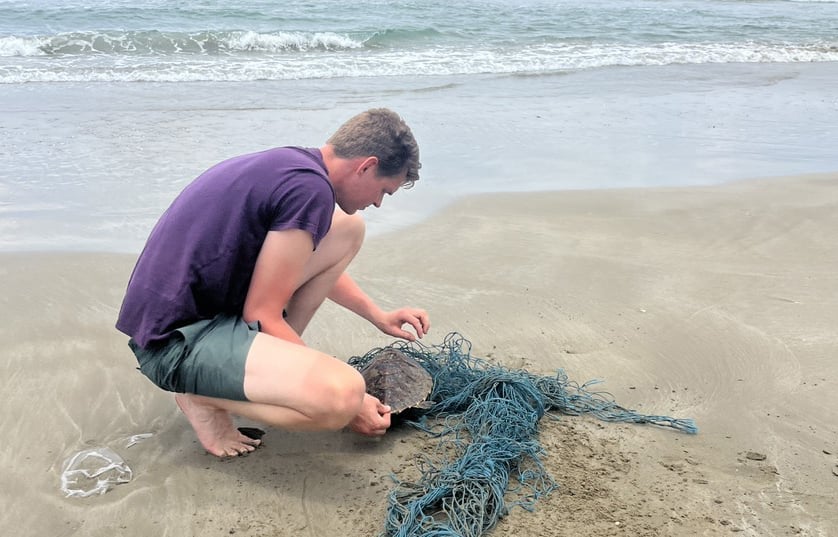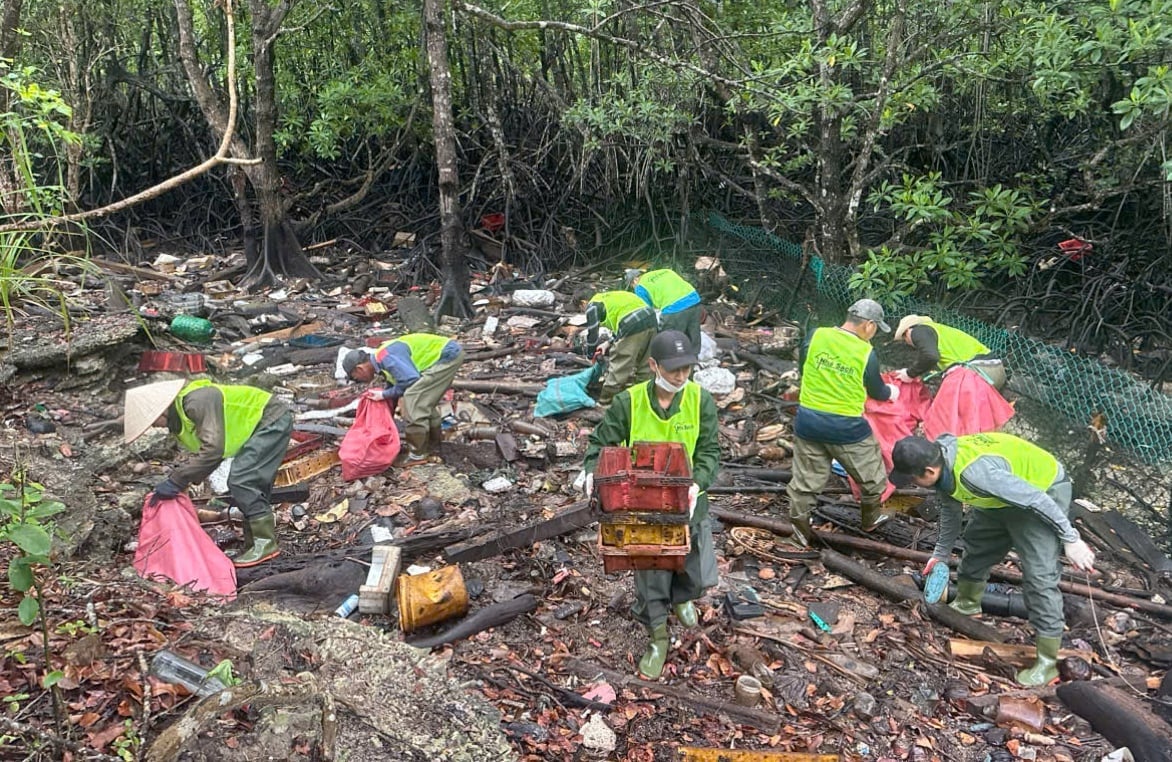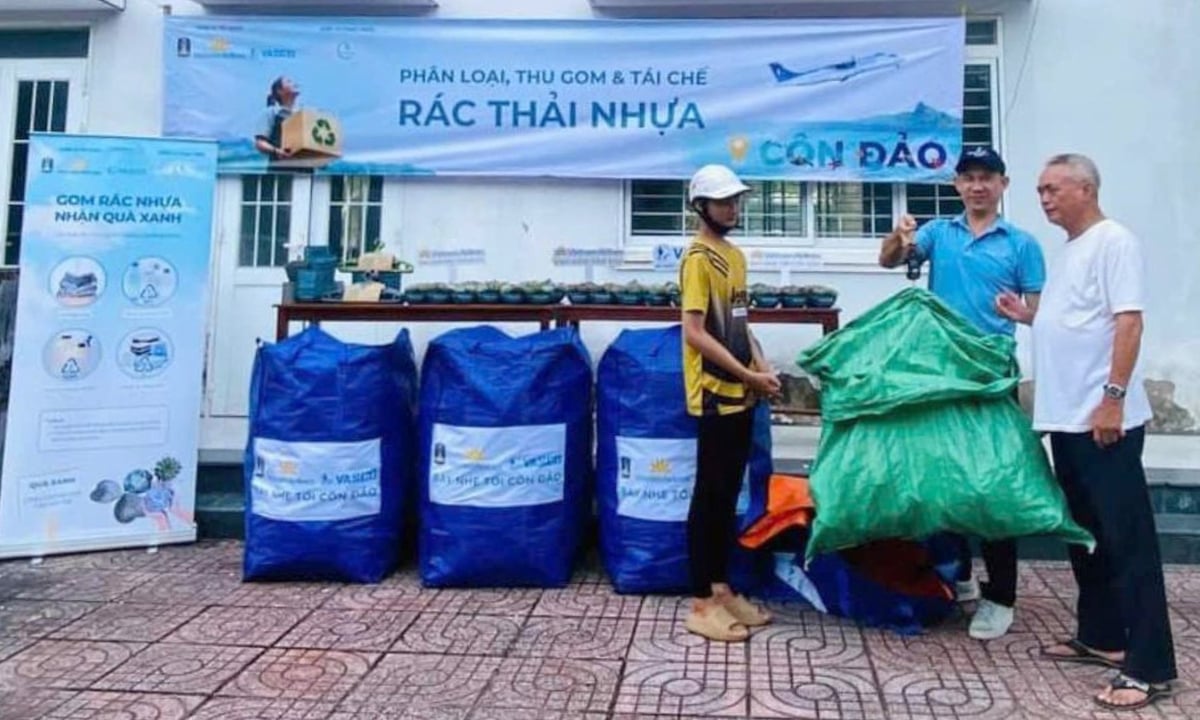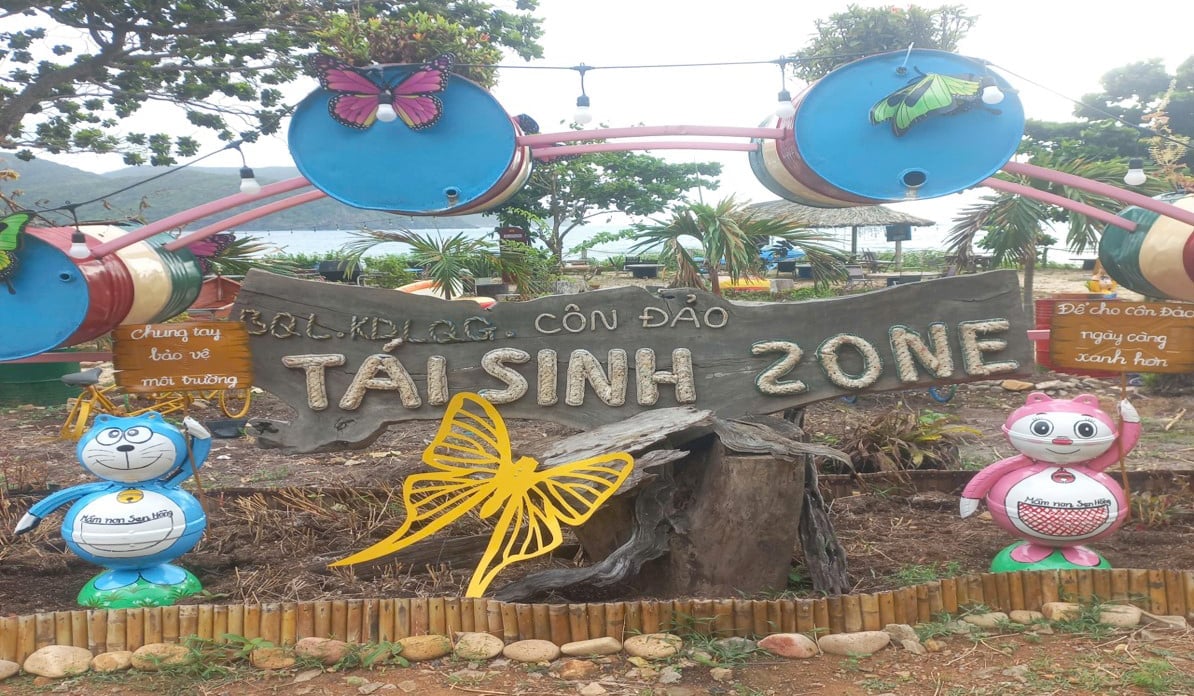November 5, 2025 | 12:32 GMT +7
November 5, 2025 | 12:32 GMT +7
Hotline: 0913.378.918
November 5, 2025 | 12:32 GMT +7
Hotline: 0913.378.918
The Con Dao special administrative region has over 13,000 residents and welcomes between 500,000 and 600,000 tourist visits each year. As a result, Con Dao is facing mounting pressure from household waste, which reaches up to 27 tons per day, with 4 to 4.3 tons being plastic waste. This is an abnormally high amount for such a small area.
The island’s only landfill, built in 1985, is now overloaded, with an estimated 100,000 tons of waste accumulated. According to WWF-Vietnam, Con Dao generates 634 tons of plastic waste annually, of which approximately 32.4 tons are leaked into the sea. This poses a serious threat to the island’s coastal ecosystems, especially coral reefs and mangrove forests.

At least 14 sea turtles in Con Dao have been entangled in or killed by ghost nets or by ingesting locally generated plastic waste. Photo: Con Dao National Park.
According to the latest report from the Special Administrative Region's People’s Committee, the island generates an average of 1.1 tons of household waste per day, equivalent to about 400 tons per year. Of that, plastic waste accounts for over 35% of the total volume.
However, due to an incomplete waste collection and treatment system, much of the waste still leaks into the environment, especially during the southwest monsoon season. It is estimated that around 20% of waste is not properly collected and ends up drifting into the sea, contributing to the marine plastic crisis in the waters surrounding the island.
Recognizing the harmful impact of plastic waste on both the ecosystem and the tourism economy, the district government (at that time) has partnered with NGOs such as WWF, Tai Sinh Zone, and local businesses to implement various waste management solutions focused on source separation and enhanced collection efforts since 2022.
A waste-sorting model has been piloted in more than 500 households across residential areas, alongside public awareness campaigns. Initial results show the rate of properly sorted and collected waste has increased from 30% in 2022 to nearly 60% by 2024.

Ocean waste collection activities are now carried out more regularly, more systematically, and with the active participation of the entire community. Photo: Phan Thi Tim.
Schools such as Le Quy Don High School and Nguyen Trai Primary School have integrated education on plastic reduction and waste sorting into their curricula. Students are guided through hands-on waste separation and regularly participate in beach clean-up activities.
In addition, tourist areas, restaurants, and homestays on the island have committed to reducing the use of single-use plastics and have installed sorting bins. Several major businesses have partnered with local enterprises to collect recyclable waste, forming a circular economy value chain.
According to Ms. Phan Thi Tim, Deputy Head of the Economic Division of the Con Dao Special Zone: “In 2023, the volume of single-use plastic waste decreased by about 25% compared to 2021, thanks to coordinated awareness campaigns and management regulations. By 2025, we aim for 85% of generated plastic waste to be collected, reused, recycled, or properly treated.”
As part of its plastic waste reduction strategy, Con Dao has set a target to drastically minimize the use of single-use plastics, one of the main sources of marine debris.
The Special Zone People's Committee has issued strict regulations banning plastic bags, straws, foam containers, and single-use plastic bottles in markets, supermarkets, and public service areas. Shops are encouraged to use eco-friendly alternatives such as paper bags, paper containers, bamboo cups, and biodegradable materials.
The communication campaign "Green Con Dao: Say No to Single-Use Plastics" has been widely implemented through various formats, including posters, videos, workshops, and hands-on activities for both tourists and residents.

The Trash for Gifts program launched by the Con Dao Special Zone People's Committee has received enthusiastic participation from local residents. Photo: Phan Thị Tim.
According to data from the Tai Sinh Zone organization, since its implementation, more than 80% of shops and eateries on the island have switched to using eco-friendly materials, helping to reduce over 30 tons of plastic waste each year.
In addition, a circular economy project supported by WWF has helped establish a system for collecting and recycling plastic waste on the island. Collected plastic is sorted, processed, and either sent to the mainland for recycling or reused as raw materials for producing environmentally friendly construction materials.
As a result, the volume of plastic waste sent to landfills has significantly decreased, along with the risk of it leaking into the marine environment.
Nguyen Van Da, Deputy Director of the Department of Agriculture and Environment of Ho Chi Minh City, commented: “The circular economy not only helps reduce waste but also creates job opportunities and promotes sustainable development for local communities.”
The success of waste management solutions in Con Dao stems from close coordination between the special zone government, businesses, non-governmental organizations, and the community.
The Special Zone People’s Committee has established a Steering Committee for Plastic Waste Reduction to ensure policy consistency and effective monitoring. At the same time, local businesses actively participate in distributing eco-friendly products and supporting waste collection and recycling efforts.

Ocean waste is collected, recycled, and creatively brought back to life transformed into vivid props used for awareness-raising activities in the battle against plastic pollution at the Tai Sinh Zone. Photo: Le Binh.
International cooperation programs have provided technical and financial resources to help the district enhance its waste management capacity, while also offering training and capacity building for local officials.
Community engagement serves as a vital lever in maintaining and expanding sustainable waste management models.
The solution to marine waste pollution in Con Dao must include effective on-land waste management, the reduction of single-use plastics, and the promotion of a circular economy.
With strong commitment from local authorities, the unity of residents, and the support of organizations and businesses, Con Dao is steadily maintaining its position as the green heart of the Southeastern sea, paving the way for a sustainable approach to ocean protection amidst the growing challenge of plastic waste.
Translated by Kieu Chi

(VAN) Low-emission production and the conditions for granting a ‘low-emission’ label for agricultural products were among the key topics addressed by the Ministry of Agriculture and Environment at the 2025 ‘Listening to Farmers’ Forum.

(VAN) The meeting took place as Viet Nam-Australia Comprehensive Strategic Partnership continues to thrive, with both sides strengthening cooperation in agriculture, trade, and technology.

(VAN) Quang Ngai is promoting the application of digital technology to expand markets for OCOP products and enhance product quality.

(VAN) The collaboration between Viet Nam and Ireland in food system transformation goes beyond capital or technology; it is a process of co-creating knowledge, starting at the policy level.

(VAN) Action plans are leaving the conference table and reaching the fields, where provinces like Dong Thap, Son La, and Nghe An are piloting models that integrate production with livelihoods and the environment.

(VAN) A new, collaborative management approach is being piloted, replacing separate silos with coordinated action across multiple sectors to build a transparent, sustainable, and accountable system.

(VAN) The Food System Transformation (FST) is expanding into the livestock sector, where biotechnology is emerging as a new direction to reduce antibiotics, enhance quality, and improve food safety.